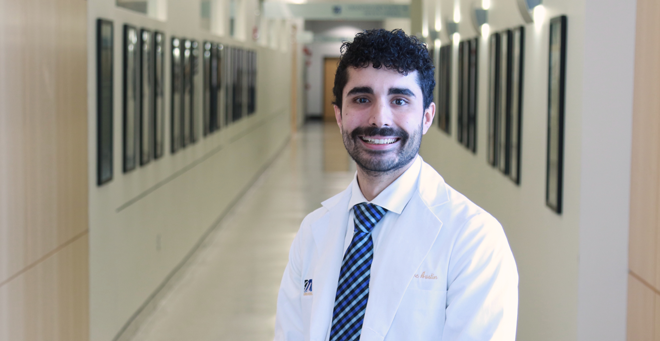 |
|
|
John-Marc Austin |
Second-year School of Medicine student John-Marc Austin has been awarded a LGBTQ+ health disparities grant from the Massachusetts Medical Society to develop curriculum materials supporting comprehensive, accurate, nonbiased information about LGBTQ+ health and health care. Austin will use the $2,000 grant to continue work he began last year employing a community-based participatory research model to improve the curriculum.
“In order for a medical school curriculum to be inclusive and properly address the health disparities facing a marginalized community, members of that community need to be involved in the creation of the curriculum,” said Austin.
Community-based participatory research is an applied collaborative approach that enables members of a community to actively participate in the full spectrum of research with a goal of influencing change in community health, systems, programs or policies.
Austin and fellow medical student Anthony Foscolos, SOM ’22, convened an advisory committee of 13 community members who represent diversity in sexual orientation, gender identity, ethnicity and socioeconomic status. The advisory committee’s feedback was the basis of updates to the doctoring and clinical skills class curriculum for taking a sexual health history. A class preparation assignment, class materials and patient simulations were also updated, and a training video for students and faculty was produced, all at the recommendation of the advisory committee members, some of whom appear in the video. Jeroan Allison, MD, MS, vice chair and professor of population & quantitative health sciences and associate vice provost for health disparities research; and John Trobaugh, manager of diversity and inclusion at UMMS, served as mentors for the project.
“I was delighted to be able to bring in community members I know from serving in Worcester PRIDE for the past eight years,” said Trobaugh, a former president of the organization that recognizes, promotes, educates and unifies the Central Massachusetts LGBTQ+ community, allies and supporters. “Through this, they are part of the curriculum change and, with the storytelling component, their stories become a permanent part of the change and maximize their impact.”
Austin will continue to work with the advisory committee to address LGBTQ+ health in other areas of the first-year medical school curriculum.
The Massachusetts Medical Society established the LGBTQ+ research grant program to encourage and incorporate cultural competency training early in medical education to improve quality, access and health care equity for patients. Awards are made to qualified medical students, residents or fellows for use in curriculum development, or to produce research that addresses LGBTQ+ health disparities.
“In addition to providing a much-needed update to the curriculum that dispels old, inaccurate and hurtful thinking, other facets make this project remarkable,” said Dr. Allison. “To our knowledge, the application of community engagement in curriculum reform is unprecedented.”
The team plans to publish analysis of the data it collected from surveys of the SOM Class of 2022, who took the updated class. The Graduate School of Nursing also plans to incorporate elements of the project into its curriculum for the Doctor of Nursing Practice degree.
“The addition of this exciting and timely new curriculum is a powerful testament to not only the innovative potential of our students, but also to their passion around educating the broader community of learners around the disparity in the care of our patients,” said Anne Larkin, MD, associate professor of surgery and senior associate dean for educational affairs. “As a faculty facilitator in this course, I witnessed firsthand the impact of John-Marc’s work, and as an academic leader, I could not be prouder of his selfless work, tireless research and excellent instruction.”